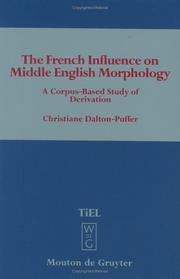| Listing 1 - 2 of 2 |
Sort by
|

ISBN: 3110149907 3110822113 9783110822113 9783110149906 Year: 1996 Volume: 20 Publisher: Berlin New York Mouton de Gruyter
Abstract | Keywords | Export | Availability | Bookmark
 Loading...
Loading...Choose an application
- Reference Manager
- EndNote
- RefWorks (Direct export to RefWorks)
The French influence on Middle English morphology : a corpus-based study of derivation Topics in English Linguistics [TiEL]
English language --- Historical linguistics --- French language --- Comparative linguistics --- anno 1100-1199 --- anno 1200-1499 --- -English language --- -French language --- -Langue d'oïl --- Romance languages --- Germanic languages --- Discourse analysis --- Foreign elements --- -French --- Morphology --- Influence on English --- Langue d'oïl --- Foreign elements&delete& --- French --- French. --- Morphology. --- Influence on English. --- Discourse analysis. --- Middle English, 1100-1500 --- Morphology (Linguistics) --- To 1500 --- English language - Middle English, 1100-1500 - Foreign elements - French. --- English language - Middle English, 1100-1500 - Morphology. --- French language - To 1500 - Influence on English.
Book
ISBN: 9782503542508 9782503542638 2503542638 2503542506 Year: 2013 Volume: 15 Publisher: Turnhout Brepols
Abstract | Keywords | Export | Availability | Bookmark
 Loading...
Loading...Choose an application
- Reference Manager
- EndNote
- RefWorks (Direct export to RefWorks)
This book is devoted to the study of multilingual Britain in the later medieval period, from the Norman Conquest to John Skelton. It brings together experts from different disciplines — history, linguistics, and literature - in a joint effort to recover the complexities of spoken and written communication in the Middle Ages. Each author focuses on one specific text or text type, and demonstrates by example what careful analysis can reveal about the nature of medieval multilingualism and about medieval attitudes to the different living languages of later medieval Britain. There are chapters on charters, sermons, religious prose, glossaries, manorial records, biblical translations, chronicles, and the macaronic poetry of William Langland and John Skelton. By addressing the full range of languages spoken and written in later medieval Britain (Latin, French, Old Norse, Welsh, Cornish, English, Dutch, and Hebrew), this collection reveals the linguistic situation of the period in its true diversity and shows the resourcefulness of medieval people when faced with the need to communicate. For medieval writers and readers, the ability to move between languages opened up a wealth of possibilities: possibilities for subtle changes of register, for counterpoint, for linguistic playfulness, and, perhaps most importantly, for texts which extend a particular challenge to the reader to engage with them.
Old English literature --- Historical linguistics --- English language --- anno 1200-1499 --- anno 1100-1199 --- Languages in contact --- Multilingualism --- Manuscripts, Medieval --- Multilinguisme --- --Grande-Bretagne --- --Moyen âge, --- 1066-1520 --- --Colloque --- --2008 --- --Bristol --- --actes --- --Foreign elements --- History --- Foreign elements --- Great Britain --- Languages --- Multilingualism and literature --- Macaronic literature --- Sermons, Medieval --- Sources. --- Foreign elements. --- Variation. --- History and criticism. --- Texts --- To 1500 --- Sources --- Middle English, 1100-1500 --- Variation --- History and criticism --- Sermons [Medieval ] --- English language - Middle English, 1100-1500 - Foreign elements --- Languages in contact - Great Britain - History - To 1500 --- Multilingualism - Great Britain - History - To 1500 --- English language - Great Britain - Foreign elements --- Manuscripts, Medieval - Great Britain --- Moyen âge, 476-1492 --- Colloque --- Grande-Bretagne --- Bristol --- Great Britain - Languages --- Germanic languages
| Listing 1 - 2 of 2 |
Sort by
|

 Search
Search Feedback
Feedback About
About Help
Help News
News